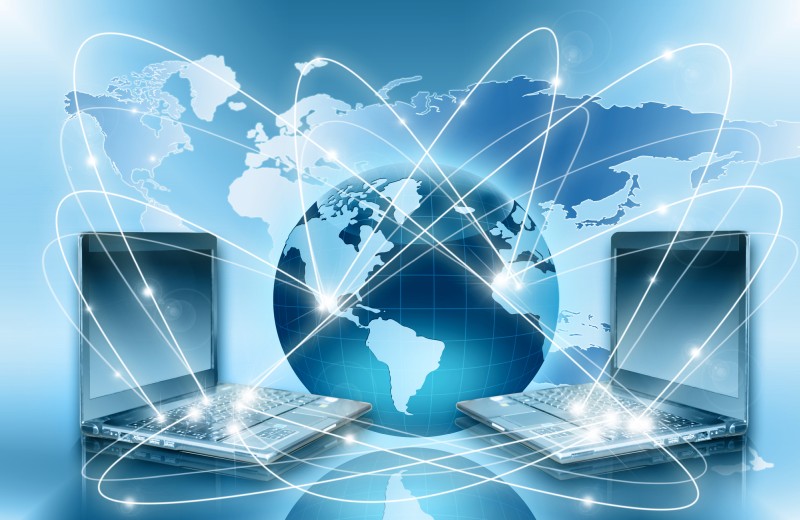The chasm between digital life and real life is thinning by the day. Nobody could really anticipate the way that life would change when two computer networks officially communicated for the first time on Jan. 1 of 1983.

What is considered the official birthday of the Internet was really the birth of a new era.
While it took several decades for the Internet to gain speed, online life is now the main cultural driver around the globe.
Was life better before the Internet? Take a look at the main pros and cons of the Internet below.
The Main Advantages of the Internet
What do we love about the Internet? It’s amazing to see how much easier the Internet has made things that used to require quite a bit of cost and effort.
The biggest theme behind how the Internet has improved life comes down to the way it’s made it possible to “do big things” using simple tools.
Take a look at the 10 major pros and ways the Internet has made our lives better.
1. Easy Access to a World of Information Online
The library of the universe is at our fingertips with the Internet! People who grew up in an era before an Internet connection was simply part of life remember how difficult it was to obtain information.
Writing a research paper meant pouring through volumes of encyclopedias that were contained in libraries.
We now have access to answers about all of life’s questions in real time. What’s more, the Internet provides access to archived information, up-to-the-minute updates, crowd-sourced information, streaming video, streaming audio, and so much more! While it’s easy to romanticize a time when everyone was unplugged, the truth is that we were in the dark about lots of topics before access to information was the norm.
2. Easy Communication With People All Over the World
Hefty lost-distance bills, spotty phone connections, and the difficulty of finding someone’s contact information all made it difficult to stay in touch during the pre-Internet days.
The Internet makes it easy to chat with friends, family, and friends you haven’t met yet from all over the world. People can connect on social media based on shared interests and hobbies to feel more accepted in the world.
3. It’s Possible to Learn About Global News and Events Instantly
Nobody needs to wait for the evening news to know the news of the world. News websites, social media, and apps all provide breaking news updates around the clock.
This can be extremely important when it comes to local news related to weather, specific dangers, community issues, local political movements, and more. What’s more, live streams allow people to form their own opinions as they watch events unfolding.
4. Benefits in Education
Learning never stops thanks to the Internet. There was a time when completing a college degree meant giving up everything to move to a campus to study.
Today’s students are able to study from anywhere using online degree programs.
Even today’s younger students are able to access educational tools online when they can’t be in school.
What’s more, the endless array of online tutorials and courses available to everyone can help people to build their skills even if they aren’t enrolled in formal programs.
5. Can work remotely or work from home
It was nearly unfathomable to think that you could work as an accountant, banker, architect, or teacher from your kitchen table just a decade ago!

However, working from home is now nearly as common as working outside of the home. The Internet has enabled many people to ditch long commutes.
6. Lots of options to socialize with people
There’s always someone to talk to on the Internet. Isolation is one of the most difficult aspects of human life for many people.
Prior to the Internet, the only way to connect with people in social settings was to go somewhere in person, pick up a phone, or hope a friend would reach out to you.
The Internet can really be thought of as a 24-hour gathering place. Many people love checking in with their friends and family on social media.
Others prefer to meet new people on chat apps, dating apps, or live streams. People are also increasingly using VR (virtual reality) platforms to “hang out” with others in the digital world.
7. The Internet Is a Marketplace for Earning Money
The Internet is the biggest marketplace in the world! While selling items or services in the past meant opening up a storefront, today’s sellers and service providers can open up digital storefronts using popular commerce platforms in minutes to gain access to millions of shoppers from around the world.
Entrepreneurs can even build their own apps and websites to get buyers in their custom sales funnels.
8. You Can Shop “the Whole World” Online
What you could purchase was largely limited by availability in the stores in your local area before the Internet.

The Internet has opened up retail competition like never before. As a result, buyers can comparison shop for the cheapest price, read product reviews, access more products, and enjoy the convenience of fast shipping.
9. Online Banking and Investing
There was a time when you needed a connection on Wall Street to invest in the big businesses of the day.
Today’s investors are now getting a stake in everything from blue chip companies to cryptocurrency.
What’s more, the many different tools, apps, and advice forums out there have helped to erase some of the mystery around investing.
There’s also the benefit that online banking allows people to pay rent, take out loans, handle payroll, and do so much more using their phones.
10. It’s Easier to Market and Advertise Products
Advertising a product in the 90s meant paying for billboard space, a television commercial, or a print ad.
All that’s needed to advertise a product today is a single Facebook or Instagram post or a Google ad.
Organic marketing allows anyone to get their products seen simply by using the right keywords for search engine optimization on social media platforms, blogs, or product websites.
What’s more, digital paid marketing tools allow anyone to spend a little bit of money on getting clicks without the need to hire a Madison Avenue firm to create a complicated campaign.
11. Smart Home Devices Are Making Life Better
Smart home devices are creating safer, easier lifestyles for millions of people! These devices allow us to “be home” when we’re not home by providing continual monitoring and access to homeowners over the Internet.
Cameras and security devices that provide remote access alert us to intruders, tell us when a fire alarm is going off, and make it possible to check in on our pets while we’re at work.
In addition to keeping us safer, smart home devices also help us to save money on energy costs. There’s even an environmental advantage! Smart thermostats allow us to adjust a home’s temperature based on time of day to reduce energy consumption. That means that people get perfectly cooled and heated homes without unnecessary waste.
All the above are feasible because of remote access we can have to our home network over the Internet.
12. Everyone Can Find Connection and Express Free Speech
The Internet provides a platform for expressing thoughts and opinions freely that has never been seen before.
People can now connect with others with shared interests and beliefs from all over the world for free (in forums, community groups etc).
Of course, connecting with people with opposing beliefs may be just as important when the goal is to expand our minds, gain understanding of others, and work together to solve problems.
People who may have felt isolated and alone in previous eras can now use the Internet to find people who share their ideals and values.
13. Cheap or Even Free Phone Calls
There was a time when chatting with someone just a few towns over resulted in a pricey long-distance phone bill.
Communicating with someone in another country was unfathomably expensive. This often meant that chats with friends and family in faraway places were reserved for holidays and big occasions.
The Internet has solved the long-distance problem. It’s now easy to chat with people in any part of the world for free using Voice over Internet Protocol (VoIP), Skype, Viber, and many other apps.
What’s more, people can now have face-to-face conversations instead of just relying on voice chats!
14. Traveling Has Never Been Easier
The Internet has made everyone an adventurer. Digital navigation tools make it easy to get directions while you’re already on the road. What’s more, Google Maps can help you to optimize your route based on current traffic patterns.
Of course, planning trips is also easier when using online booking apps that display pricing and availability for hotels, flights, and attractions.
15. Easy and Cheap Entertainment Is Accessible for All
The Internet has opened up thousands of options for streaming content. While many paid subscriptions are available, users can also take advantage of endless selections of free shows, movies, podcasts, music channels, and more. The result is a fully customized entertainment schedule that can be enjoyed from anywhere.
The Main Disadvantages of the Internet
The Internet isn’t perfect. In fact, many people struggle to make peace with the fact that all of the benefits of the Internet are balanced by some very dark downsides. Take a look at the disadvantages of the Internet in a connected age.
1. Cyberbullying Is a Big Problem
According to DoSomething.org, roughly 37% of young people between the ages of 12 and 17 have been bullied online.
Cyberbullying can be more damaging than “schoolyard” bullying because it’s constant.

There is no “escape” when the bullying is happening on your phone. What’s more, it’s very easy for bullies to spread false or damaging information through texts and social media.
Unfortunately, young people who experience cyberbullying are at greater risk for both self-harm and suicidal behaviors.
A study released in 2018 found that young victims of cyberbullying are twice as likely to attempt suicide and self-harm.
2. Identity and Data Theft
The Internet put all of the personal details we used to tuck away in our wallets into huge databases.
While that can make life very convenient when you’re doing online banking, logging in to shop online, or getting instant payments through a payment app, there’s also the ever-looming potential for breaches.
Cyber criminals from around the world work tirelessly to hack into accounts to obtain personal information that they can use to make fraudulent purchases.
Some hackers even focus on trying to get email passwords of ordinary people just to be able to scam their friends and family out of money using elaborate lies about needing money in an emergency.
The good news is that there are many programs in place that help to protect identities.
3. It’s Getting Harder to Maintain Your Privacy
Every step we take online helps to create a breadcrumb trail. Many of us willingly share personal information online when posting pictures, “checking in” at locations for our friends to see, or sharing our political opinions.
However, we often don’t realize that our personal information is being sold as valuable “data” whenever we make purchases, browse products, or read news websites.
It turns out most of us aren’t happy about the “price of privacy” that we pay just to be able to use the Internet.
According to a 2021 survey released by Cisco, 86% of consumers “care about data privacy.”
A 2020 survey by McKinsey & Company reveals that only 10 percent of consumer respondents say that they trust consumer-packaged-goods or media and entertainment companies.
4. People Are Missing Face-to-Face Socialization
Internet interactions have replaced face-to-face socializing for many people. While many people enjoy the convenience of Zoom meetings, classroom sessions, and family reunions, the truth is that in-person interaction is an important part of the human experience.
According to experts, in-person social interaction is linked with better mental health, a lower risk of dementia, a deeper sense of safety and belonging, and a feeling of being able to confide in others.
5. Brick-and-Mortar Businesses Are at Risk
The rise of online shopping is hurting Main Street. Rising real estate costs paired with reduced foot traffic may mean the end of many stores and businesses.
Shopping malls are increasingly feeling the pinch of major retailers shutting their doors. Insiders are expecting nearly 50% of department stores in malls to be closed in the near future.
6. The Internet Can Become an Addiction
The data is still unclear regarding the Internet’s effects on mental health. However, troubling information has emerged in many studies.
A study from 2018 found a link between internet usage and anxiety and depression among college students.
There’s also a new phenomenon called Internet addiction (IA) that is defined by problematic, pathological, or compulsive Internet use.
A study from 2020 found that 56% of children with attention deficit hyperactivity disorder (ADHD) suffer from some form of Internet addiction.
Roughly 12% of non-ADHD children suffer from Internet addiction.
7. Fake News Can Spread Easily on the Internet
Disinformation and hoaxes are rampant on the Internet. Fake news is defined as “false or misleading information masquerading as legitimate news.”
The good news is that one study estimates that “fake news” accounts for just 0.15% of the daily media diet of Americans.
However, fake news can be extremely polarizing. What’s more, hoaxes that spread on the Internet can be damaging to reputations.
The topic of how to deal with fake news has sparked fierce debates on free speech, censorship, and social media policies that aren’t likely to be settled at any point soon.
8. Product Fraud Is Rampant
The Internet makes it easier for scammers to sell fake merchandise online. The Federal Trade Commission (FTC) received more than 2.2 million fraud reports from consumers in 2020.
Unfortunately, scammers are able to take advantage of the fact that buyers aren’t seeing merchandise in person to sell fake goods.
There have been reports of scammers selling everything from counterfeit baby food to fake Nike sneakers.
In addition, some scammers actually collect money without sending any products at all. It’s extremely difficult for authorities to help customers get refunds from fly-by-night scammers located all around the world.
9. Source of Distraction for Students
Today’s younger generation may be the most distracted generation in history. Social media, gaming apps, messaging apps, and the constant buzz of breaking news all create distractions around the clock.
What’s more, the very devices that students use for homework are the same ones that supply those constant digital dopamine hits from entertainment sources.
The Internet may even be changing our brains. A 2019 study found that the Internet can produce both acute and sustained alterations in specific areas of cognition that can alter attention-keeping capacities, memory processes, and social interactions.
10. Inappropriate Content Is Readily Available to Kids
One of the darker aspects of the Internet is the access it unlocks to illicit and damaging content. Younger online users are increasingly being exposed to sexual content, violent content, and hateful content.
What’s more, adults use the Internet to groom children for sexual exploitation. According to the Child Crime Prevention and Safety Center, more than 50% of victims of online sexual exploitation are between the ages of 12 and 15.
Adults often pose as peers to convince children and teens to give up personal information, send sexualized photos and videos, or meet in person.
11. Internet-Related Obesity Is Becoming a Problem
The Internet is contributing to an increase in sedentary lifestyles among people of all ages. Time that used to be spent outdoors is now being replaced by time spent streaming videos, texting with friends, and scrolling social media.
Some studies have determined a link between excessive Internet usage and obesity. In addition to increasing risks for obesity, the sedentary lifestyle associated with heavy Internet usage can also put people at risk for diabetes, heart disease, stroke, and many other health conditions.
12. Hacking Risks to Internet Connected Systems
The Internet makes everyone vulnerable to data breaches. Everything from medical history to financial information gets stored on the Internet. This means that hackers are constantly trying to access information that can be used to scam us.
Since most systems today are connected to the Internet, anyone can attack them (even if they are thousands of miles away). Hostile nations or hacking groups are constantly trying to exploit weaknesses on Internet connected systems.
13. Excessive Spending Is Ruining Financial Lives
Online shopping sprees are common because they don’t require a trip to the store. People are bombarded with “quick links” to goods online that drive an impulse-buy culture.
What’s more, online shopping with a saved payment option disconnects us from the act of “paying” for our purchases. Many people turn to online shopping to avoid loneliness, boredom, and depression.
14. Violent Online Gaming Is a Problem
The availability of online gaming apps makes it possible for kids to purchase games without notifying their parents.
These games often have violent content that is not appropriate for all ages. In some cases, kids may be communicating online with adults through these games without the knowledge of their parents.
15. The Internet Never Forgets
The permanence of the Internet can be especially problematic for teens. Adolescents and teenagers simply don’t have the brain development necessary to understand that anything that is shared on the Internet via text, email, or social media can be used against them in the future when they seek out professional opportunities.
Teenagers may use poor judgement when saying things for “shock value” online without fully understanding the ramifications. What’s more, images or videos that are shared without their approval can be difficult to remove from the Internet.
I remember the pre-internet days. So many things are much quicker and easier today, but overall I wouldn’t say the good derived from internet technology outweighs the bad. Smart, creative, and resourceful people could find ways to get all they wanted and needed in the 80s.
Being now 71, I find looking for useful Info a lot easier since back in the days most Libraries were not very up to date with the proper books design to educate ones own needs beyond possible schools feedback, even then it was limited. Can this new source of providers be harmful, as with any discovery, its the uneducated that fails to notice the truth. Garbage In, Garbage Out-